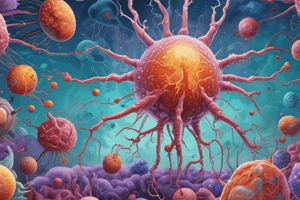Podcast
Questions and Answers
How does HCT compare to conservative management for CGD patients?
How does HCT compare to conservative management for CGD patients?
- HCT is riskier and less effective than other treatments.
- HCT and conservative management yield similar outcomes.
- HCT results in better health and quality of life. (correct)
- HCT leads to poorer health outcomes than conservative management.
What is a benefit of using myeloablative conditioning (MAC) in HCT?
What is a benefit of using myeloablative conditioning (MAC) in HCT?
- It lowers the risk of graft failure and enhances myeloid engraftment. (correct)
- It increases the risk of infection after the procedure.
- It guarantees a successful transplant for all patients.
- It eliminates the need for any type of conditioning.
When is it advisable to conduct HCT for CGD patients?
When is it advisable to conduct HCT for CGD patients?
- Only when the patient shows mild symptoms.
- Only after conservative treatments have failed.
- At any age for all patients regardless of their condition.
- As early as possible, especially for those with severe infections. (correct)
What potential future development is mentioned regarding CGD treatment?
What potential future development is mentioned regarding CGD treatment?
What is the projected impact of HCT on life expectancy for CGD patients?
What is the projected impact of HCT on life expectancy for CGD patients?
What is the primary defect in Chronic Granulomatous Disease (CGD)?
What is the primary defect in Chronic Granulomatous Disease (CGD)?
Which of the following is an increased risk for patients with CGD?
Which of the following is an increased risk for patients with CGD?
What unique trend has been observed in recent CGD patients undergoing gene therapy?
What unique trend has been observed in recent CGD patients undergoing gene therapy?
What is the only curative treatment currently available for CGD?
What is the only curative treatment currently available for CGD?
Which intervention has been shown to reduce the risk of infections in patients with CGD?
Which intervention has been shown to reduce the risk of infections in patients with CGD?
What complication related to gene therapy was observed in two patients in Germany?
What complication related to gene therapy was observed in two patients in Germany?
How has the life expectancy of CGD patients changed over recent decades?
How has the life expectancy of CGD patients changed over recent decades?
What increase in survival rate has been seen following hematopoietic cell transplantation (HCT) for CGD?
What increase in survival rate has been seen following hematopoietic cell transplantation (HCT) for CGD?
Flashcards are hidden until you start studying
Study Notes
Chronic Granulomatous Disease (CGD)
- CGD is a genetic primary immunodeficiency caused by dysfunctional NADPH oxidase complex in neutrophils and monocytes.
- Characterized by recurrent severe infections, dysregulated inflammation, and autoimmune phenomena.
- NADPH oxidase complex generates reactive oxygen species (ROS) critical for eliminating bacterial and fungal pathogens.
Risks and Complications
- Increased susceptibility to life-threatening infections from catalase-positive bacteria and fungi.
- Associated inflammatory complications include chronic granulomatous colitis.
- Female carriers of X-linked CGD face higher risks of infections and autoimmune disorders.
- Neutrophil oxidative capacity correlates with severe infection risk in female carriers.
Treatment Options
- Hematopoietic stem cell transplantation (HCT) is currently the only curative treatment for CGD.
- Gene therapy is under exploration as an alternative treatment.
Gene Therapy Case Study in Germany
- Two adult males with CGD, aged 25 and 26, received gene therapy using a gamma-retroviral vector expressing gp91phox.
- Treatment included low-dose busulfan at 8 mg/kg.
- Initial results: ~15% of blood neutrophils expressed gp91phox within five months; clinical improvements noted with resolution of infections.
- Complications arose from gene marking and insertional activation of proto-oncogene MDS1-EVI1, leading to myelodysplastic syndrome (MDS).
Advances in CGD Management
- Life expectancy for CGD patients has more than tripled, due to increased awareness, azole antifungals, and improved infectious and inflammatory management.
- Rising incidence of triazole-resistant Aspergillus poses new challenges.
- Survival rate after HCT improved from ~85% pre-2000 to >90% in recent studies, effective regardless of donor source.
HCT and Patient Quality of Life
- Children receiving HCT show better health and quality of life than those on conservative management.
- HCT recommended for all CGD patients, independent of sex, mutation, or clinical presentation.
- Myeloablative conditioning (MAC) reduces graft failure risk and supports long-term myeloid engraftment.
Future Considerations
- Early HCT is advisable; a definitive cure is also pursued for adolescents/young adults with severe infections and autoinflammatory history.
- Improved accessibility and tolerance of HCT may significantly increase CGD patients’ life expectancy in forthcoming years.
- New SIN-lentiviral vectors and optimized conditioning regimens could make gene therapy a viable option for patients without suitable donors.
Studying That Suits You
Use AI to generate personalized quizzes and flashcards to suit your learning preferences.





